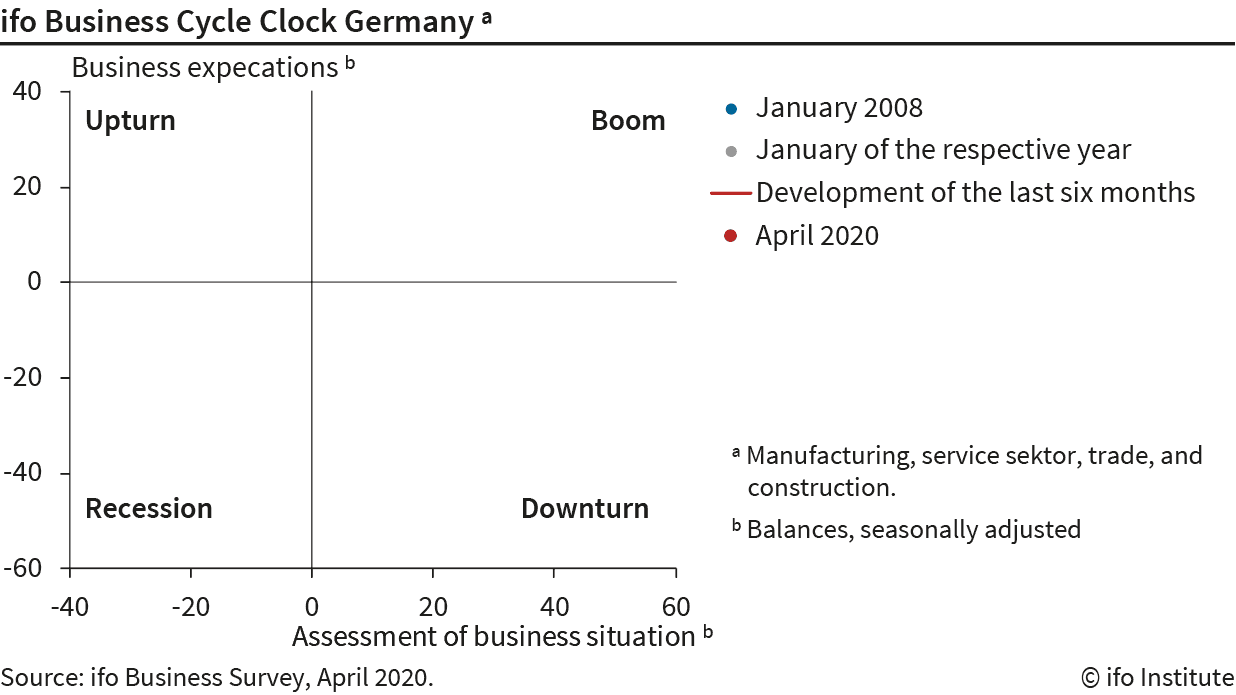ifo Business Climate Index Plunges to Historic Low (April 2020)
Sentiment at German companies is catastrophic. The ifo Business Climate Index crashed from 85.9 points (seasonally adjusted) in March to 74.3 points in April. This is the lowest value ever recorded, and never before has the index fallen so drastically. This is primarily due to the massive deterioration in the current situation. Companies have never been so pessimistic about the coming months. The coronavirus crisis is striking the German economy with full fury.
Download

In manufacturing, the Business Climate Index has fallen to its lowest value since March 2009. Industrial companies’ current business situation worsened dramatically. Expectations are marked by extreme pessimism. The expectations indicator fell to a historic low. Demand for industrial products has collapsed.
In the service sector, the business climate indicator fell to a record low. Service providers have never reached such a poor assessment of their current situation. The pessimism of their expectations is also without precedent.
In trade, the Business Climate Index continued to nosedive. Assessments of the current situation have never worsened so quickly. Expectations came in even lower than March’s record low.
In construction, the index has never sunk so abruptly. The same is true for the indicator of the current situation and for expectations. However, the majority of construction companies are still satisfied with their current situation.
Clemens Fuest
President of the ifo Institute

The ifo Business Cycle Clock shows the cyclical relationship between the current business situation and business expectations in a four-quadrant diagram. In this diagram, economic activity – shown on a graph plotting the economic situation against expectations – passes through quadrants labeled with the different phases of activity, namely upturn, boom, downturn, and recession; provided that the expectation indicator sufficiently precedes the current business situation indicator. If survey participants’ assessments of both the current business situation and business expectations are negative on balance, the economic situation indicator is in the “recession” quadrant. If the expectations indicator is positive (with a poor but improving business situation on balance), economic activity is shown in the “upturn” quadrant. If the business situation and business expectations are both positive on balance, economic activity is shown in the “boom” quadrant. If, however, the expectations indicator turns negative (with a good but deteriorating business situation on balance), economic activity slips into the “downturn” quadrant.
ifo Business Climate Germany
(Index, 2015 = 100, seasonally adjusted)
| 04/19 | 05/19 | 06/19 | 07/19 | 08/19 | 09/19 | 10/19 | 11/19 | 12/19 | 01/20 | 02/20 | 03/20 | 04/20 | |
| Climate | |||||||||||||
| Situation | |||||||||||||
| Expectations |
Source: ifo Business Survey.
© ifo Institute
ifo Business Climate Germany and by Sector
(Balances, seasonally adjusted)
| 04/19 | 05/19 | 06/19 | 07/19 | 08/19 | 09/19 | 10/19 | 11/19 | 12/19 | 01/20 | 02/20 | 03/20 | 04/20 | |
| Germany | |||||||||||||
| Manufacturing | |||||||||||||
| Service Sector | |||||||||||||
| Trade | |||||||||||||
| Construction |
Source: ifo Business Survey.
© ifo Institute





